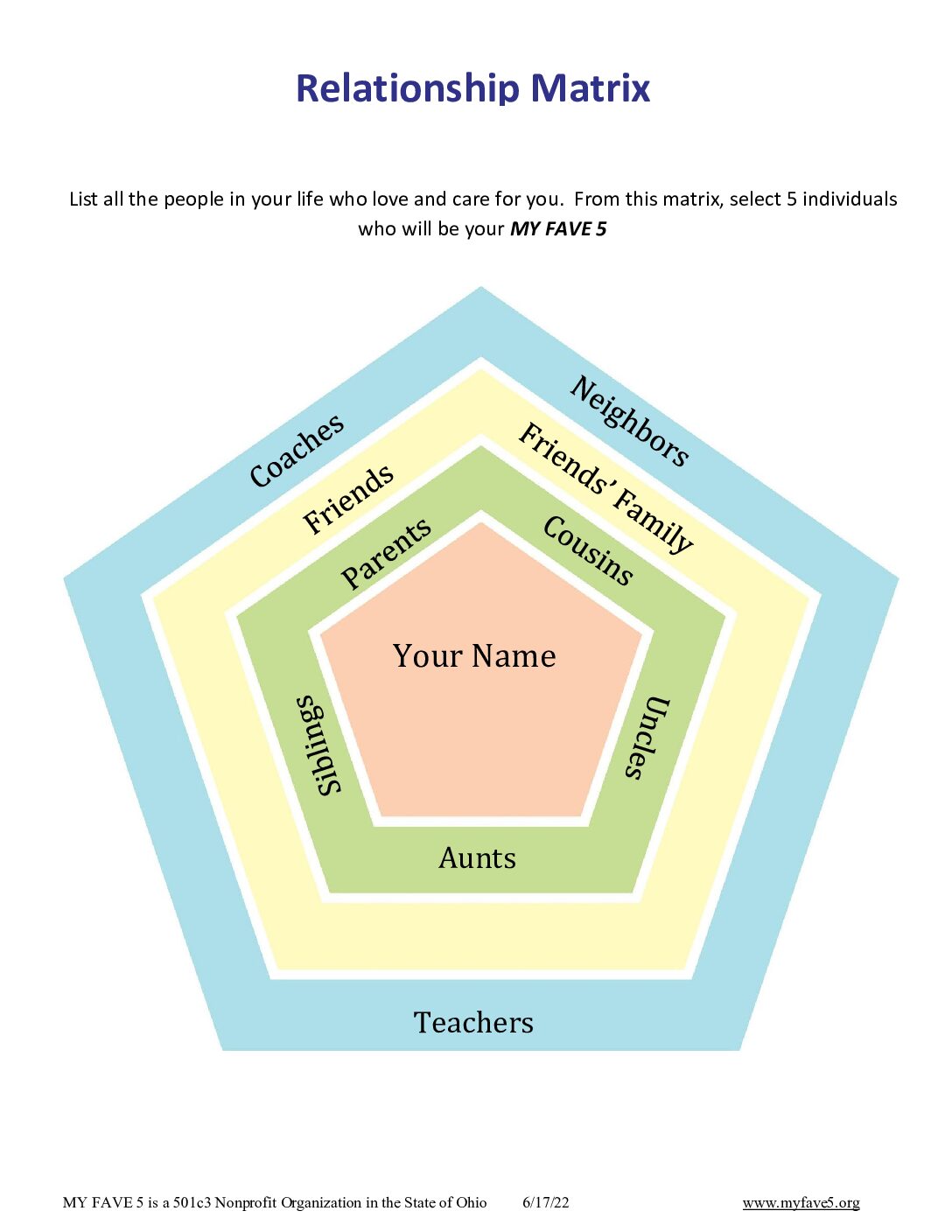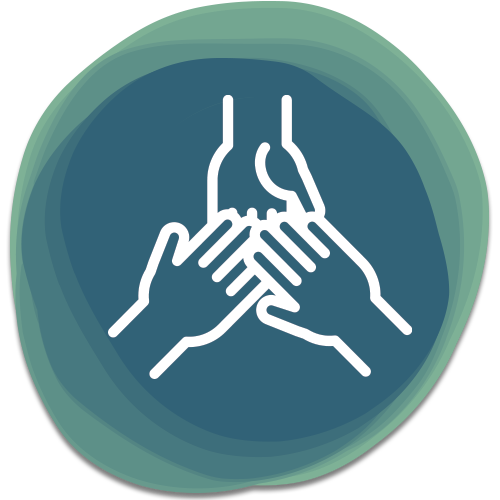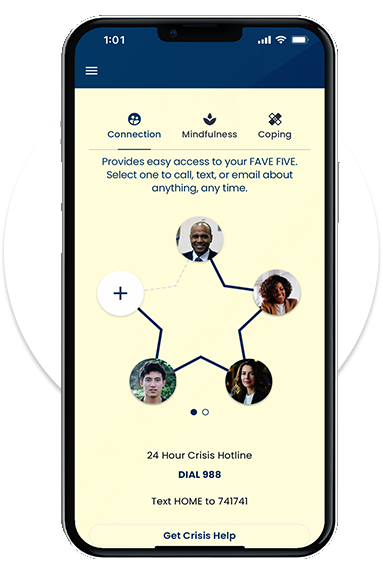The Relationship Matrix
And Mental Wellness
The relationships we cultivate play a crucial role in our journey towards mental wellness and a fulfilling life. Humans are inherently social creatures, and our interactions with others can significantly impact our mental and emotional health. Positive relationships can provide support, reduce stress, and enhance our overall well-being. Research by Helen Gilbert (et al.) reported that relationships that include effective communication, cultural sensitivity, and an absence of coercion lead to trust. Conversely, negative or strained relationships can contribute to mental health challenges such as anxiety and depression. This extended guide aims to help you understand and optimize the relationships in your life through the Relationship Matrix.

Overview of the Relationship Matrix
The Relationship Matrix is a tool designed to help you evaluate and understand the various connections in your life. This framework assists in identifying and nurturing those relationships that contribute positively to your well-being. By categorizing the people in your life based on their proximity and impact on your emotional and mental health, you can focus on nurturing the most important ones and setting boundaries where necessary.
Remember, everyone needs support from time to time, but no one can give it 100% of the time. Relationships flow two ways, and by assessing the connections you feel closest to, you can help these critical relationships grow mutually solid and healthy.
What is the Relationship Matrix?
Definition and Purpose
The Relationship Matrix is a visual or conceptual tool for categorizing and assessing relationships in your life. It helps you understand who your core supporters are and who might be in your extended network. By mapping out these relationships, you can better manage your social interactions and ensure that you have a robust support system in place.
Benefits of Using a Relationship Matrix
- Clarity and Insight: Gain a clearer understanding of your social network.
- Focus on Key Relationships: Identify and prioritize relationships that need more attention.
- Improved Mental Health: Strengthen your support system, which can reduce stress and enhance well-being.
- Boundaries and Balance: Learn to set healthy boundaries and balance your social interactions.

Developing the Relationship Matrix
Steps to Create Your Relationship Matrix
- List All Relationships: Start by listing all the people in your life who love and care for you.
- Categorize Relationships: Divide them into different circles of distance (Immediate Family, Extended Family, Friends, and Friends’ Families, Coaches, and Teachers).
- Assess Quality: Evaluate the quality and impact of each relationship on your mental health.
- Prioritize: Identify critical relationships that need more nurturing.
- Set Boundaries: Establish boundaries to protect your mental health.
Who May Be in the Relationship Matrix?
Family Members
Close family members, including immediate family and extended relatives, are usually a core part of one’s relationship matrix.
Friends
Close friends, acquaintances, and social connections form an essential part of the matrix.
Community Members
People from one’s local community, including neighbors, local business owners, and community leaders.
Healthcare Providers
The relationship matrix may include therapists, counselors, doctors, and other healthcare professionals in mental health.
Support Network
This can include support groups, sponsors (in recovery programs), or other individuals who provide emotional or practical support.
Educational Connections
This might include teachers, professors, classmates, or academic advisors for students or those in educational fields.
Spiritual or Religious Connections
If applicable, this could include religious leaders, spiritual advisors, or members of one’s faith community.
Professional Connections
The matrix often includes people with whom you want to build and nurture relationships in a business context. These can include colleagues, mentors, industry peers, potential clients, and professional contacts.
Service Providers
People who provide regular services, such as financial advisors, lawyers, or personal trainers.
Online Connections
In today’s digital age, online friends, social media connections, and virtual community members may also be part of one’s relationship matrix.
Tools and Resources for Building Your Matrix
- Social Network Maps: Visual tools to map out relationships.
- Therapeutic Worksheets: Exercises to assess and improve relationship quality.
Immediate Family
Role and Importance
Immediate family members are typically our closest and most influential people. They provide emotional support, guidance, and a sense of belonging. Understanding the role of the immediate family can help you strengthen these vital relationships.
Strategies to Strengthen Relationships
- Regular Communication: Maintain open and honest communication. This can be a call, text, or photo share to let people know you’re thinking about them.
- Quality Time: Spend meaningful time together to develop a common context for mutual understanding.
- Support and Empathy: Show empathy and support during challenging times. Supporting others can have a huge impact on your own well-being.
- Conflict Resolution: Address and resolve conflicts healthily and constructively. This can take work, especially with family.
- Shared Activities: Engage in activities that everyone enjoys to develop a familiar context and build a shared culture.
Challenges and Solutions
- Distance and Separation: Use technology to stay connected. MY FAVE FIVE creates a frictionless space for FAVES to communicate directly, away from the distractions of modern life and social media. If you are not sharing physical space, mindfulness and active listening help bridge the distance.
- Conflict and Misunderstandings: Practice active listening and compromise. Ask for clarification if you are not feeling comfortable with something someone said. Try not to wait and simmer over meanings that may or may not be implied.
- Different Life Stages: Understand and respect each other’s life stages and experiences. It can be hard to hear advice or not give it. Remember that we all learn and grow in unique ways. If you aren’t sure, ask before offering feedback or advice.
Extended Family
Role and Importance
Extended family members, while not part of your daily life, provide additional support and a broader sense of community. These relationships can offer different perspectives and enrich your social network.
Strategies to Strengthen Relationships
- Family Gatherings: Organize regular family events and gatherings, or attend them when someone else has organized one, and offer to help or bring supplies.
- Stay in Touch: Use social media and technology to keep in touch.
- Offer Support: Be there for extended family members during significant life events.
- Share Memories: Celebrate family traditions and share memories.
- Collaborative Activities: Engage in projects or activities that involve the extended family.
Challenges and Solutions
- Geographical Distance: Plan visits and use virtual communication tools. Virtual Reality has made huge strides and can provide connections that phone calls and texts may not.
- Diverse Opinions: Respect differing opinions and find common ground. Listen and ask questions to find common ground.
- Family Dynamics: Navigate complex family dynamics with empathy and understanding.
Friends and Friends’ Families
Role and Importance
Friends and their families provide emotional support, companionship, and a sense of belonging. This group changes as we age, and it will often be larger and more diverse. Each individual will have a unique history and a set of experiences that we may know nothing about. And that’s part of the fun! These relationships are crucial for social well-being and mental health.
Strategies to Strengthen Relationships
- Regular Meetups: Schedule regular get-togethers.
- Open Communication: Foster open and honest communication.
- Support Networks: Be part of each other’s support networks.
- Shared Interests: Engage in activities that you both enjoy.
- Celebrate Milestones: Celebrate each other’s successes and milestones.
Challenges and Solutions
- Busy Schedules: Plan ahead to make time for friends.
- Misunderstandings: Address and resolve misunderstandings promptly.
- Different Life Paths: Respect each other’s life choices and support one another.
Coaches and Teachers
Role and Importance
Coaches and teachers play a significant role in personal and professional development. While they may enter and exit our lives quickly, their impact is often significant. People in this group provide guidance, mentorship, and support in various areas of life. These people aren’t likely to end up in your FAVE FIVE unless you have a longer connection history. In some cases, these people may become friends, but there are often external reasons that they may be unable to connect.
Strategies to Strengthen Relationships
- Regular Check-ins: Maintain regular communication.
- Set Goals: Work together to set and achieve goals.
- Feedback and Improvement: Seek and provide constructive feedback.
- Professional Development: Engage in continuous learning and development.
- Show Appreciation: Recognize and appreciate their efforts and support.
Challenges and Solutions
- Communication Gaps: Ensure clear and consistent communication.
- Different Expectations: Align expectations and set clear goals.
- Balancing Roles: Balance the professional and personal aspects of the relationship.
Building and Maintaining Your Relationship Matrix
Meaningful Relationships
Meaningful relationships, such as those with family and close friends, play a significant role in mental health. These relationships provide essential support but can also become strained, particularly when one person is heavily relied upon. Individuals need to have multiple meaningful relationships to avoid overburdening a single person and to ensure a support network is in place.
Communication and Empathy
Effective communication is central to building strong relationships. In mental health care, the quality of interaction between service users and providers significantly impacts the therapeutic relationship. Approachable, non-judgmental, and empathetic communication fosters trust and rapport, which are essential for positive outcomes.
Social Network Mapping
Tools like Social Network maps can help identify and understand the relationships within an individual’s social network. Our Relationship Matrix can be used as an initial inspiration and launch point, but every individual’s relationship matrix is unique.
Policy and Gender Considerations
Policy, gender disparities, or economic challenges can impact relationships. For example, women’s mental health is often influenced by societal expectations and institutional inequities. It is important to consider yourself and the contacts you’d like to invite to your FAVE network. Effective communication can help build stronger, more supportive relationships, whether an individual directly offers support or not.
Therapeutic Alliances
Therapeutic relationships between service users and health providers are crucial. These alliances are built on trust, mutual respect, and collaborative goal-setting. Health providers bring professional expertise, while service users contribute their personal values and goals. This partnership helps foster recovery by focusing on the service user’s strengths and resources, ultimately aiming for the user to take charge of their recovery process. Your health service provider is a great person to help review your relationship matrix. They can also help advise who might be a great person to invite to your FAVE FIVES.
Overcoming Challenges in Building a Relationship Matrix
Common Challenges and Their Solutions
- Fragmented Work Processes: Develop a collaborative team approach to making your relationship matrix. Talk to someone in your inner circle – they may be able to help make helpful suggestions.
- Communication Barriers: Foster open and transparent communication. If you have a negative feeling, try to remember that it is not likely to be intentional. Practice calming techniques and level speaking. Try to be flexible and practice active listening.
- Emotional and Psychological Strain: Manage conflicts and set healthy boundaries.
Tips for Effective Implementation
- Regularly Review Your Matrix: Keep it updated and relevant. Your network will change as you, or your connections, grow and age. This is natural. Try to remember that these changes present you with an opportunity!
- Seek Feedback: Regularly seek feedback from your support network. Remember, their honesty may feel negative, but even conflict can be positive, and trust is an essential aspect of a healthy relationship.
- Practice Self-Care: Take care of your mental and emotional health. This may mean going for that walk you put off or call a friend for coffee.
- Stay Flexible: Be willing to adapt and make changes as needed. This can be hard, but remember that relationships involve multiple people, and we all have things going on. If one of your FAVEs isn’t around, call another one! The goal of a healthy network is to ensure you have multiple supports.
- Engage in Continuous Learning: Keep learning and improving your relationship skills.
Key Points
Creating a Relationship Matrix helps you understand the importance of each connection in your life. By categorizing your relationships, you can prioritize where to invest your emotional energy and build a more robust support network. Remember, fostering meaningful relationships is a continuous process contributing significantly to your mental wellness and overall happiness.
By implementing these strategies and focusing on the Relationship Matrix, you can create a supportive and empathetic environment that encourages open communication and emotional growth.

Strength Through Connection
Additional Resources
Further Reading
Books, articles, and websites on resilience and the 7 Cs.
Back to Resources…